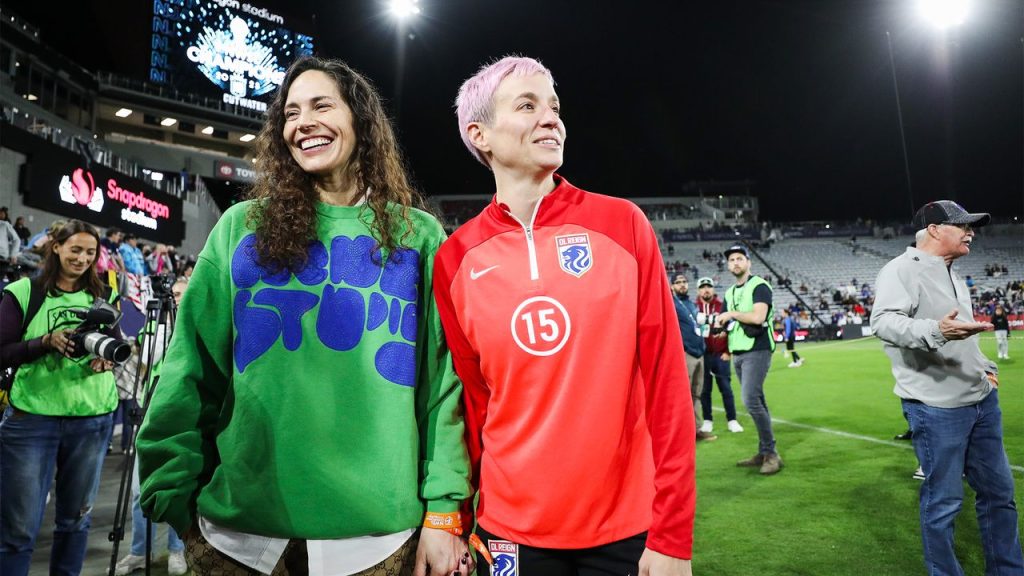Rapinoe: It’s the wildest, in-the-wild thing I’ve ever seen. Crossing the street or walking in any city in the whole country and it’s like, “Hi Sue!” Adorable.
Bird: So it’s really not that surprising. I think that’s what’s so interesting about this time. There are certainly some things about what’s happening in the world of women’s sports that are new, don’t get me wrong. But then there’s some things that are getting highlighted and it’s like, you just weren’t looking at it before.
I guess the question then becomes, why did it take so long to have these conversations?
Bird: How much time do you have?
Rapinoe: Um…I think it’s sexism. Broadly.
Bird: It’s the isms. The ways in which it’s just been held back. It has always been this way. I was in college, it was my junior year, I hit a game-winning shot. The year is 2000 and there’s no social media. You’re only going to see this so many ways, but it was on the ESPN top 10. Immediately the next day, and then following week, I was getting all kinds of calls from celebrities to the basketball office. I wouldn’t drop names, I don’t want to be that person, but it was, like, NBA players were calling to congratulate me, like, “Oh, let’s exchange information.” Actors were calling. Like, “I’m a big fan.”
It’s always been there. That’s how suppressed and held back this sport, and women’s sports in general, has been. The same goes for soccer. Tons of people have been going to your games for years and years and years. There’s a variety of things that finally ripped the blinders off people to women’s sports, and now they’re seeing all of it when it was already there.
Rapinoe: I also think the mechanism for information delivery changed dramatically. So, prior, if you weren’t watching ESPN and it didn’t make the top 10, or the producer didn’t choose to talk about women’s sports, women’s sports weren’t talked about. Your Final Fours were sold out, the community’s been there. But from a broad cultural perspective, it wasn’t spoken about. It was suppressed, it was held back. Women’s sports social media just really blew the top off of who was getting access to what was actually happening. Before Caitlin Clark, before some of these bigger things—those moments were already happening.
Bird: Some of the moments are the fight for equal pay, combined with Sedona Prince’s TikTok showing the discrepancies during the bubble NCAA tournament season, our WNBA bubble season, Kobe Bryant wearing a WNBA hoodie…there’s a whole paper trail of all these moments that eventually got to a tipping point. And yes, Caitlin Clark, Angel Reese, Paige Bueckers—this new generation for basketball plays a huge role.
Do you feel a sense of responsibility to shape this wave of attention so that it leads to long-term change?
Bird: I think we do. We can do it our way on the podcast—again, circling back on everything we’ve already said—by speaking on it in a nuanced way, bringing in history, bringing in expertise…
We’ve gotten past the phase—which is great—of, Is this real? Does this have staying power? We’ve actually gotten past that. It’s pretty real, we’re legit now, it’s here to stay. But now there’s this land-grabby feel to it. I really encourage people not to do that and to actually be strategic with whatever decision you’re making around women’s sports. Wherever you want to put your money, whatever player, team, league, whatever it is that you want to be connected to, be strategic. Don’t just throw money at it because you’re trying to get in. I think that’s going to play a huge role in taking it to the next level.
Rapinoe: Over my dead body am I going to be one of the chorus of us who’ve been here a long time, who have helped build this, who is going to not own what is happening in the future. We have this opportunity to be one of many crafting what is going to be an unbelievable time in American sports culture, just in general, but in women’s sports culture specifically. I think women are going to own the next decades-long phase of American sports culture.

